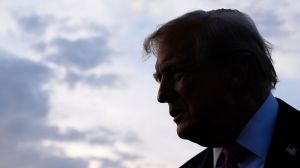Rollback on their lips, Kashmir on their mind
In private, President Pervez Musharraf tells US diplomats that Pakistan will ‘‘permanently’’ close off passage of milita...

In private, President Pervez Musharraf tells US diplomats that Pakistan will ‘‘permanently’’ close off passage of militants into Kashmir. In public, however, the Pakistani general never goes so far — and last week reversed himself outright, telling an interviewer, ‘‘I’m not going to give you an assurance that for years nothing will happen’’ on Kashmir. The statement sent US diplomats scrambling for reassurance on the precise point that earlier this month persuaded India to back down from a threatened attack in Kashmir, which had raised the spectre of all-out war between the rival nuclear powers. Secretary of State Colin Powell picked up the phone. Charge d’affaires Nancy Powell paid Musharraf a personal visit. And by Monday, a State Department spokesman was calling Musharraf’s original promise ‘‘a commitment that’s made very clear.’’
But here, support for Kashmir’s ‘‘freedom fighters’’ has been a firm national policy for so long that it is a part of the public school curriculum, which urges ‘‘simple stories that will incite students to jihad.’’ Musharraf has yet to signal that that policy is being reversed. ‘‘If this is a turning point, it would mean not only stopping infiltration, it would mean disbanding these groups’’ who carry the fight across the Line of Control, said A H Nayyar, an analyst at the Sustainable Development Policy Institute. ‘‘The formation of private militias will have to be outlawed. They’ll have to be completely disbanded, de-fanged.’’
No such actions are being proposed publicly. And privately, senior Pakistani officers describe the militants as a vital component of Pakistan’s defense posture, a fifth column-in-waiting trained to mount rearguard actions against an advancing Indian army. ‘‘What army in the world can wage war when it is being attacked by its own people from right, left, centre and the back?’’ asked a senior Pakistani military source. ‘‘Once the hostilities break out, can anyone perceive any other scenario for the Indian army in Kashmir?’’
So it is that, inside the military circles that long have steered Pakistan’s Kashmir policy and now control its government, the recent ban on infiltration is widely regarded as a tactical move rather than a policy shift, according to recent interviews with senior officers. In Islamabad, independent analysts join officials in emphasising that India must offer direct talks on Kashmir if the world is to avoid a replay of last month’s standoff. It is the absence of such a peaceful avenue that propels the logic behind Pakistan’s support for the militants. ‘‘If incidents are not happening, the Indians say there’s nothing to discuss, because there is no resistance,’’ said Tahir Amin, a professor of international relations at Quaid-I-Azim University here. ‘‘And if the incidents occur, Indians say, ‘Terrorism is going on!’’’
Pakistan’s national preoccupation is framed there as the ‘‘unfinished business of partition.’’ ‘‘Kashmir is a part of us,’’ said Shireen Mazari, director of the Institute of Strategic Studies here. ‘‘For us it indicative of India’s drive from Day One to undermine the state of Pakistan and not accept the sovereignty of Pakistan.’’
Public and private news outlets alike refer to ‘‘Liberated Kashmir’’ and ‘‘Occupied Kashmir.’’ Desk calendars of stunning Himalyan scenes highlight ‘‘Indian Occupied Kashmir: Beautiful But Bonded.’’ A 1998 national poll of issues Pakistanis called ‘‘very important’’ ranked Kashmir roughly equal with economic stability and ethnic conflict — all well behind ‘‘nuclear issues.’’
‘‘It is mostly emotional,’’ said Nayyar, a peace activist. ‘‘When times are very hard, people begin to say ’Why are we so involved in Kashmir? Why don’t Kashmiris take care of themselves?’’’
When decades of acquiescence disappeared in late 1988 with a series of attacks on Indian soldiers, the attackers were indigenous Kashmiris. In the 1990s, volunteers begin crossing the LoC from training camps in Pakistan side, often with the ISI’s assistance. Initially called ‘‘azadis,’’ the volunteers eventually took on the mantle of jihadis. Pakistan officially encouraged the religious zeal, endorsing ‘‘jihad’’ billboards on highways and donation boxes in shops. Official enthusiasm flagged only after September 11, when the US pressured Musharraf to abandon support for the Taliban in Afghanistan and speak out against ‘‘religious extremism’’ in his own country. But any change in emphasis assumes the consent of Pakistan’s military, the one institution most deeply invested in Kashmir. The stand-off also preoccupies the corps commanders to whom Musharraf, in the absence of elections, ultimately must answer, several analysts emphasised.
(LA Times-Washington Post)





- 01
- 02
- 03
- 04
- 05


























